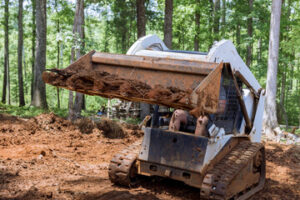An excavation contractor is responsible for preparing the ground for substantial construction projects. They work with specialized or heavy equipment to change the landscape by leveling, digging and adding other components.

Look for a professional with experience and a commitment to safety. Also ask about their equipment fleet and technology and their transparency on costs. Visit bartexcavationllc.com for more details.
A key part of an excavation contractor’s job involves site preparation. This may involve removing obstacles that could interfere with construction, such as tree roots, trunks, debris, or the remnants of an old building. It may also involve preparing the site for foundations, trenching for utilities, and grading the land to ensure proper drainage.
This preparation work can take several months for larger projects, such as infrastructure developments. This is due to the need for a thorough soil analysis and dealing with issues that could interfere with the project, like buried utilities, environmental risks, or underground obstructions.
An excavation company can also help with utility disconnections. This includes services such as water, sewage, gas and electric lines. It’s important to have these disconnected before any demolition or digging begins, as they could pose a risk to workers and the surrounding environment.
Once the site has been prepped for construction, an excavating contractor can begin to dig. This is a crucial step to ensuring that the structure will be strong and stable once it’s complete. These contractors must dig to the correct depth and ensure that the soil meets engineering specifications.
An excavating contractor can also help with road construction, paving and grading. This is necessary for constructing access roads and driveways to the construction site. It’s important to have these completed before construction begins to avoid costly delays.
Leveling
During the building of a home or road, it’s essential to keep the ground leveled according to construction plans. This requires the use of heavy machinery to adjust the terrain’s slope and contour, contributing to foundation stability and overall project integrity.
An excavation contractor is able to offer this service because they have years of experience operating heavy machinery like bulldozers, backhoes and front-end loaders. These contractors can dig holes for a home or a pool, dig trenches and backfill around concrete work, and even clear the land before construction starts by removing trees, shrubs, rocks and other debris.
Many residential excavation companies also perform demolition. This is because both processes largely use the same equipment. They can take down anything from a shed to an old house, and they’re usually equipped with trucks that can bring materials to the site and haul away waste, preventing delays on-site.
Once the land is prepped for construction, an excavation contractor can perform leveling. This process involves moving dirt from high places to low ones, which helps in building a stable foundation for structures and optimizing drainage.
Another crucial task excavators take on is installing underground utilities. This includes sewage, electrical and water systems. This can require digging narrow trenches for the pipes and ensuring these are properly installed to prevent future issues.
An excavation company, can help manage the soil quality of a build site. They can remove any contaminated materials that may have been left behind by previous activities and then implement soil remediation practices. They can also handle the management of stormwater runoff, which helps to prevent everything from water pollution and soil loss to habitat degradation and human property damage.
Digging
Whether preparing a site for an industrial structure or leveling dirt to make way for a residential home, an excavation contractor’s responsibilities are crucial to the success of any construction project. From land clearing and digging to integrating vital utilities, they lay the groundwork for successful project completion. The specific duties of an excavating contractor can vary, but they always prioritize precision, safety, and cost-efficiency.
While you may be tempted to take on the work yourself, excavation is a complex job best handled by professionals who have experience in this field. They are trained to operate heavy machinery and ensure that the excavation process is done correctly, helping you avoid costly mistakes and delays. An experienced excavation contractor can also navigate the permit process and develop timelines that help you stay on schedule.
A good excavation company can also help you with the following services:
Grading: An essential service, grading involves leveling and sloping soil to improve drainage and stability. It’s critical for avoiding water pooling, which can weaken foundations and potentially damage structures. This is often done during the pre-construction stage, allowing contractors to build their foundations with confidence.
Trenching: For underground utility installation, excavating contractors create narrow holes to lay pipes and cables. This requires careful planning to avoid damaging existing infrastructure and ensuring the safety of all workers.
When selecting a professional excavation company, be sure to ask about their licensing requirements and insurance coverage. You should also inquire about their safety commitment and equipment, as well as their adherence to state and local regulations regarding soil disturbance and waste disposal. In addition to these important factors, you should ask about their experience and whether they have any previous references.
Integrating Vital Infrastructure
Many excavating contractors provide services beyond digging and moving dirt. For example, they may build and grade roads. They can also dig ponds, sewers and ditches and operate trenchers that insert flexible pipes beneath the earth without creating trenches. This type of work requires advanced skill and precision. It also involves close coordination with construction professionals to ensure that excavation activities align with the broader goals of the project.
Contractors who specialize in excavating often handle grading, which includes leveling and sloping the soil for proper drainage and foundation support. This allows water to flow away from the building and reduces risk of structural damage. It also helps prevent soil erosion that can lead to the destruction of grass and plants. Additionally, it allows for the installation of sidewalks and commercial paving, which increase property value, usability and curb appeal.
Excavating and grading companies also manage the demolition of existing structures and natural obstacles to make way for new projects. For example, if an old house is on the site of a new apartment complex, it must be removed to create space for parking lots and roads. In addition to this, they are also responsible for the installation of vital infrastructure like utilities and foundation supports.
Excavating and grading contractors are business owners who operate independently or as subcontractors to large general contractors. They typically solicit competitive bids for their services, set rates based on the going rate in their area and establish bookkeeping and payroll systems. They also establish a business license, insurance coverage and follow safe jobsite practices. The earning potential for excavating contractors varies, but it can be substantial depending on their experience and the size of the projects they handle.
Erosion Control
The processes involved in excavation can change the erosive characteristics of soil. Over time, this can have a profound impact on nearby homes, businesses and natural areas. It can also negatively affect water quality and wildlife habitats. Erosion control minimizes these impacts by protecting exposed soil from wind and rain. Erosion control methods include the use of erosion blankets, sediment basins, silt fences and other methods to limit nutrient runoff, sediment transfer and erosion.
Erosion control is a critical part of any construction project, regardless of whether the site is a residential or commercial development. It is also an integral component of any utility trenching project that involves laying underground water pipes, electrical wires or gas lines. In these situations, excavators must carefully dig trenches to protect these vital conduits from the elements while ensuring that their work is completed safely and effectively.
During excavation projects, contractors must regularly monitor the conditions of the site and implement any necessary changes to prevent potential issues that could delay progress or increase project costs. This includes assessing slope grades and determining whether the soil is prone to erosion or other problems, such as flooding.
Other services an excavation company may offer to clients include:
Precision planning: The success of any construction project depends on careful planning. Excavating contractors are skilled at creating detailed plans that take into account topography, soil conditions and project specifications. They coordinate with builders and engineers to ensure that every step of the excavation process aligns with broader construction goals.
